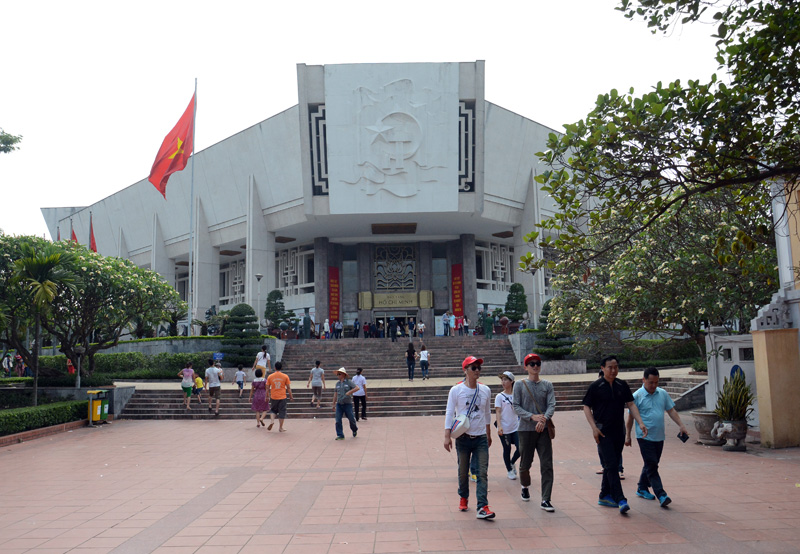
Ho Chi Minh Museum in Hanoi, an important historical and cultural relic of the capital and the country, was inaugurated on May 19, 1990. The museum, the Ho Chi Minh Mausoleum and the relic site create a combination of architecture, history and culture to commemorate the beloved leader of the Vietnamese people, the outstanding soldiers of the national liberation movement, and international communist and workers movements.
|

Ho Chi Minh Museum is
located at No. 19,
Ngoc Ha
Street (Ba Dinh,
Hanoi) and is a four-storey building with a
total area of over 10.000 square metres. The building is designed based on
the image of a lotus flower bloom, symbolising the virtuousness of President
Ho Chi Minh.
|
|
|
.jpg) |
The
exhibition area of the museum is nearly 4000 square metres, introducing more
than 100 thousand original artefacts and images reflecting the life and career of
President Ho Chi Minh, associated with the important historical events of
Vietnam and the
world, from the end of the 19th century to the present.
.jpg)
At the
drawing-room of the museum, there is a standing bronze statue of President Ho
at a height of 3.5 meters and weighing three tonnes. Uncle Ho statue is located
in front of a banyan tree and the sun, which are the symbol of light and the
longevity of the nation.
.jpg)
The
museum features three main sections, with the opening section presenting the
life and revolutionary career of President Ho Chi Minh and the Vietnamese
people who executed the will of the President Ho Chi Minh City.
.jpg)
Area
reproduces the house of President Ho Chi Minh’s family.
.jpg)
This
place shows the documents and artefacts on the revolutionary life of Uncle Ho
and the cause of national liberation in
Vietnam.
.jpg)
After
nearly twenty years of inauguration, the Ho Chi Minh Museum has collected and
received over 7,000 documents, artefacts and films, including many rare
original objects.
.jpg)
The
number of visitors to the museum has been increasing, especially on national
holidays and weekends, with the number of visitors increasing to twenty
thousand people.
Source: NDO
In the last historic days of April, blending with the joyful atmosphere of the whole country, on the streets of Hoa Binh City, flags, banners and slogans are brilliantly decorated to celebrate the 50th Anniversary of Southern Liberation and National Reunification. Here are the records from Hoa Binh newspaper’s reporters:
Nestled halfway up the mountains in Cao Son commune, Da Bac district, Sung village appears like a picture preserved intact through generations. With a history of over 300 years, the village is home to nearly 100 households of Dao Tien ethnic group – the people who still maintain their distinctive characteristics in housing architecture, clothing, customs and traditional crafts. The village is drawing increasing interest and exploration from both domestic and international tourists, as every visit becomes a cultural journey to experience the authenticity, friendliness, and hospitality of this highland region.
This Spring, more than 1,000 phoenix trees in Thang Hamlet, Thach Yen Commune (Cao Phong) have bloomed brilliantly, quickly spreading on social media. The picturesque beauty of the flower garden has attracted the participation of many people to admire and take photos.
This belief is both a guiding principle and a lifelong ambition for Sa Van Cam, a member of the Tay ethnic group in Da Bac district and a passionate advocate for the Tay culture. The native has devoted years to the revival, preservation, and teaching of the ancient Tay script.
Located just 25 km from Hoa Binh city and approximately 100km from Hanoi, with a journey of around 1 hour 45 minutes, Ngoi Hoa ecotourism site (PriorBay Resort) in Suoi Hoa commune, Tan Lac district, is a stunning peninsula retreat, and a standout destination within the Hoa Binh Reservoir tourism area. Officially opening in February this year, the resort captivates visitors with its distinctive vacation products and a range of exciting adventure experiences.
Over 1,500 women paraded in traditional ao dai (long dress) at Hoa Binh Square on March 5 to mark Ao Dai Week 2025 launched by the Vietnam Women's Union. Organised by the provincial Women’s Union in collaboration with the city’s chapter, the annual event features lively folk dance performances and a colorful parade that celebrated the beauty of Vietnam’s traditional dress and its rich cultural heritage.



.jpg)
.jpg)
.jpg)
.jpg)
.jpg)
.jpg)